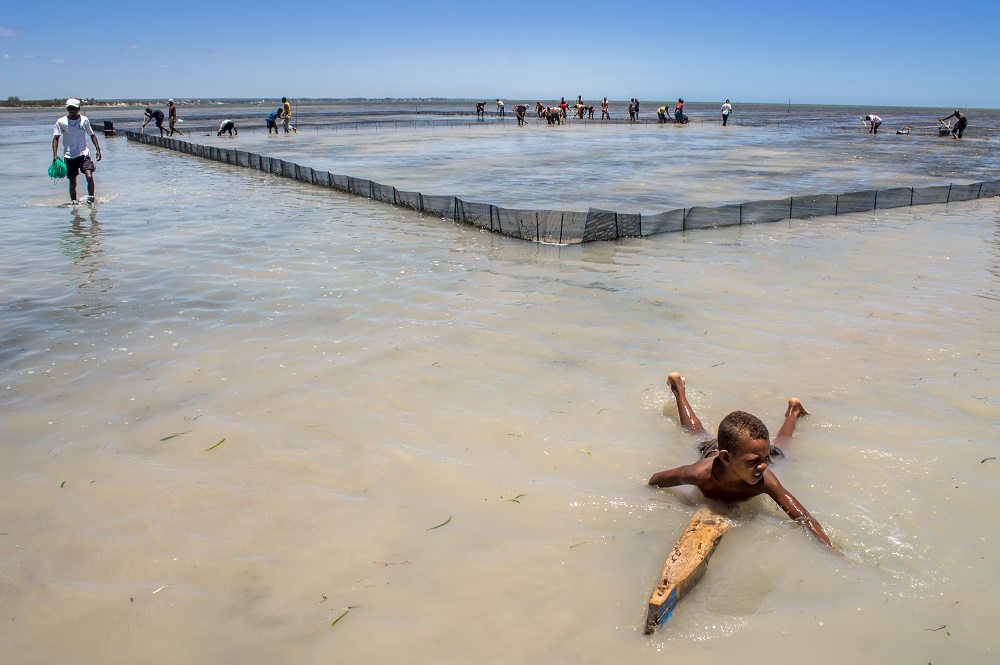March Seaweed & Sea Cucumber Sales
S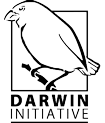 eaweed and sea cucumber sales are now taking place monthly in the Bay of Ranobe and the results are impressive. In the village of Betsibaroke, seaweed farmers had their first sale, and sold a whopping 2,402 kg of dried seaweed. Together with the villages of Ifaty, Mangily and Ambolomailaky, over 5,000 kg of seaweed was harvested and sold in March. For the sea cucumber farming villages of Andrevo and Ambolomailaky, almost 1,600 sea cucumbers were sold over two nights. Combined, our Darwin Initiative funded alternative livelihoods project injected 3,073 USD (9,635,500 MGA) into the economies of these villages.
eaweed and sea cucumber sales are now taking place monthly in the Bay of Ranobe and the results are impressive. In the village of Betsibaroke, seaweed farmers had their first sale, and sold a whopping 2,402 kg of dried seaweed. Together with the villages of Ifaty, Mangily and Ambolomailaky, over 5,000 kg of seaweed was harvested and sold in March. For the sea cucumber farming villages of Andrevo and Ambolomailaky, almost 1,600 sea cucumbers were sold over two nights. Combined, our Darwin Initiative funded alternative livelihoods project injected 3,073 USD (9,635,500 MGA) into the economies of these villages.
With such large scale success across the bay of Ranobe, it is sometim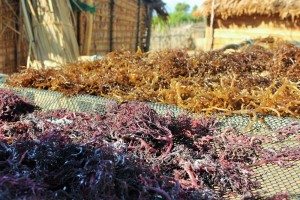 es easy to forget the impact that this project is
es easy to forget the impact that this project is
having at smaller scales. With this in mind, we explored how alternative livelihood activities are reducing vulnerability and enhancing well-being in the Bay. Ivana Rubino spoke with households engaged in seaweed and sea cucumber farming about their experiences, and we will be sharing these insights with you in the months to come. The first account is of seaweed farmer Ferolle and his wife Vola.
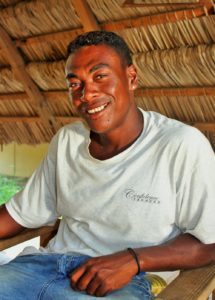 Ferolle (33) and Vola (30)
Ferolle (33) and Vola (30)
Village: Ifaty
Occupation: Seaweed farmer and turtle fisher
“When I only relies on fishing I could come home with no fish,” Ferolle says. “Life is easier now and is less tiring. Fishing is tiring but that is now a second activity after seaweed farming”. Ferolle is a big man, and it easy to imagine him rowing his lakana (ocean-going pirogue) out of the Bay to find the big fish in the Mozambique Channel, or hauling in his large fishing nets. He does not look like the sort of person to tire easily, and his comments speak more to the difficulty of fishing as a livelihood, than his personal stamina. “I still fish three afternoons a week, (but) I am no longer worried about finding food. I can always expect to get something at the end of the (seaweed) growing cycle”.
Ferolle and Vola have been farming seaweed since early 2015. Ferolle grows the seaweed in the water while Vola dries the seaweed and takes care of the operation on land. Their success at seaweed farming has allowed Ferolle to expand his experiences and he has received further training as a community seaweed technician.
“I always enjoyed seaweed farming, but being a technician is very cool”, he says.
As a community technician, Ferolle assists villagers that want to start farming seaweed. He teaches them how to manage their seaweed ropes to grow the best seaweed, and how to solve any problems that might arise. “I had the opportunity to learn, and now I have the opportunity to teach others”.
It is clear that Ferolle and Vola’s involvement in seaweed farming is improving their quality of life. “Our extra 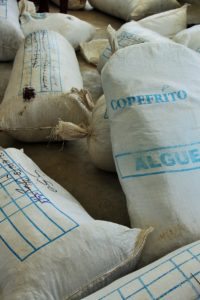 income depends on what we produce every month but with the money we have made we can make provisions that we could not make before. We have more time and more money and can take care of our family better. Things I didn’t have before or couldn’t afford, I now can have.”
income depends on what we produce every month but with the money we have made we can make provisions that we could not make before. We have more time and more money and can take care of our family better. Things I didn’t have before or couldn’t afford, I now can have.”
For Ferolle, part of reason he enjoys seaweed farming is that culturally, it is similar to fishing. “It is good to be able to combine farming and fishing. The seaweed project could have been started a long time ago”, he says. Ferolle identifies with the Vezo people of southwest Madagascar – those who make their livelihoods from the ocean. The sea and fishing are integral parts of Vezo culture, and form their group identity. “It fits with the Vezo lifestyle because it is not taking away part of being Vezo. It suits Vezo life”. Ferolle and Vola’s success in seaweed farming is largely dependent on how well it conforms to the local culture. “I enjoy it as a Vezo man”.
Story by Head of Aquaculture Cale Goulding & Interview by RD Comms Officer Ivana Rubino

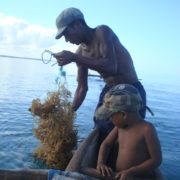
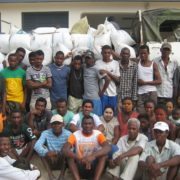
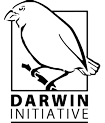 It was a busy month for seaweed farmers across the Bay of Ranobe in February, with sales taking place in four villages.
It was a busy month for seaweed farmers across the Bay of Ranobe in February, with sales taking place in four villages.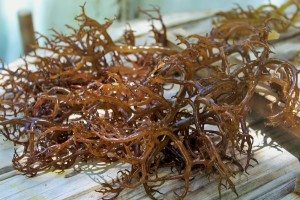
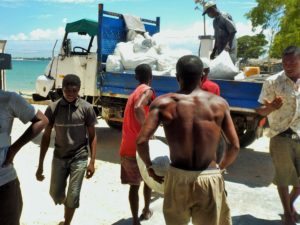 While there are numerous methods of growing seaweed, in Madagascar the Off-Bottom Method, where seaweed is grown on ropes just off the seabed, is the most common. Reef Doctor experimented with numerous growing techniques, and introduced the Long-Line Method to the farmers of the Bay of Ranobe. This system uses floating ropes placed in deeper water, and consequently has numerous benefits. Improved access to sunlight and nutrients allows for faster growth, alongside reduced competition with seagrass. Farmers have access to their farms at any time, and can work from their boats, avoiding exposure to the harsh elements. Additionally, the location of the farms is more flexible, avoiding any potential conflicts over access to the marine environment. This technique has proven to be so favourable that the Long-Line Method is spreading to other seaweed producing regions throughout the SouthWest Madagascar, as word travels.
While there are numerous methods of growing seaweed, in Madagascar the Off-Bottom Method, where seaweed is grown on ropes just off the seabed, is the most common. Reef Doctor experimented with numerous growing techniques, and introduced the Long-Line Method to the farmers of the Bay of Ranobe. This system uses floating ropes placed in deeper water, and consequently has numerous benefits. Improved access to sunlight and nutrients allows for faster growth, alongside reduced competition with seagrass. Farmers have access to their farms at any time, and can work from their boats, avoiding exposure to the harsh elements. Additionally, the location of the farms is more flexible, avoiding any potential conflicts over access to the marine environment. This technique has proven to be so favourable that the Long-Line Method is spreading to other seaweed producing regions throughout the SouthWest Madagascar, as word travels. 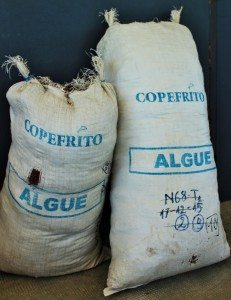
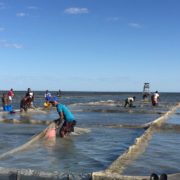
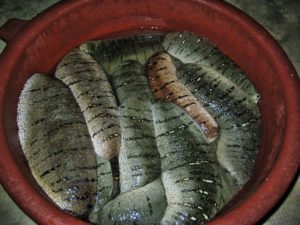 everyone was in high spirits while the processing took place. Weighing takes place as quickly as possible so that all the sea cucumbers can be processed before the tide starts to come in again. By 2:30am the processing was complete and everyone left the farms to return to the village for a few hours sleep before 6am when the final stages of the sale took place and the farmers were paid for their crop.
everyone was in high spirits while the processing took place. Weighing takes place as quickly as possible so that all the sea cucumbers can be processed before the tide starts to come in again. By 2:30am the processing was complete and everyone left the farms to return to the village for a few hours sleep before 6am when the final stages of the sale took place and the farmers were paid for their crop.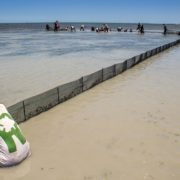
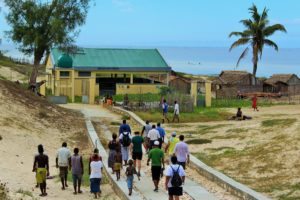
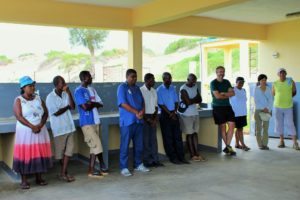
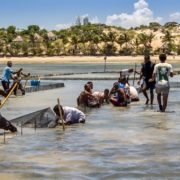
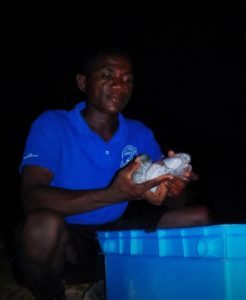 Story by Cale Golding and Oriana Wouters (Aquaculture Team), and Ivana Rubino (RD Comms Officer)
Story by Cale Golding and Oriana Wouters (Aquaculture Team), and Ivana Rubino (RD Comms Officer)